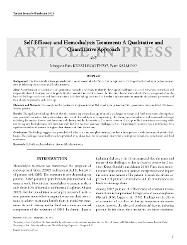| dc.contributor.author | Krespi-Boothby, Margörit Rita | |
| dc.contributor.author | Salmon, Peter | |
| dc.date.accessioned | 2019-06-28T11:11:03Z | |
| dc.date.available | 2019-06-28T11:11:03Z | |
| dc.date.issued | 2013 | |
| dc.identifier.issn | 1300-2163 | en_US |
| dc.identifier.uri | https://hdl.handle.net/20.500.12469/1436 | |
| dc.identifier.uri | https://www.semanticscholar.org/paper/%5BSelf-efficacy-and-hemodialysis-treatment%3A-a-and-Boothby-Salmon/8e020bd6768a3744a0f14379c1012997beadb75c | |
| dc.description.abstract | The theoretically driven approach to the measurement of self-efficacy fails to capture the challenges that hemodialysis patients experience in following their dietary and fluid restrictions. Aims: A combination of qualitative and quantitative research is necessary to identify the range of challenges associated with these restrictions and to quantify them if clinicians are to be guided in their consultations with patients. In this study the construct of self-efficacy was grounded on the basis of challenges to dietary and fluid restrictions and the findings were used to develop a questionnaire to quantify the patients' perceptions of their ability to overcome each challenge. Materials and Methods: The sample for the qualitative study consisted of 16 hemodialysis patients and the quantitative study included 156 hemodialysis patients. Results: The qualitative findings showed that the patients experienced a range of specific challenges to dietary and fluid restrictions. Among these were practical constraints being with others the view of hemodialysis as compensating for dietary non-compliance and emotional challenges including discomfort distress and boredom with dietary and fluid restrictions. The most common challenge to fluid restrictions was eating while not having any fluid allowance left. Boredom with diet was the most common challenge to diet. Hemodialysis treatment was a justification for a significant number of patients to neglect their dietary and fluid restrictions. Conclusion: The findings suggest that grounded self-efficacy is a unitary phenomenon but that it incorporates a wide spectrum of specific challenges. The challenges identified herein have provided an evidence base for educational interventions to improve compliance with dietary and fluid restrictions. | en_US] |
| dc.language.iso | eng | en_US |
| dc.publisher | Turkish Association of Nervous and Mental Health | en_US |
| dc.rights | info:eu-repo/semantics/openAccess | en_US |
| dc.subject | Diet and fluid restrictions | en_US |
| dc.subject | Hemodialysis | en_US |
| dc.subject | Self-efficacy | en_US |
| dc.title | Self-efficacy and hemodialysis treatment: A qualitative and quantitative approach | en_US |
| dc.type | article | en_US |
| dc.relation.journal | Türk Psikiyatri Dergisi | en_US |
| dc.identifier.issue | 2 | |
| dc.identifier.volume | 24 | en_US |
| dc.department | Fakülteler, İktisadi, İdari ve Sosyal Bilimler Fakültesi, Psikoloji Bölümü | en_US |
| dc.identifier.scopus | 2-s2.0-84880592737 | en_US |
| dc.institutionauthor | Krespi-Boothby, Margörit Rita | en_US |
| dc.institutionauthor | Krespi-Boothby, Margörit Rita | en_US |
| dc.relation.publicationcategory | Makale - Uluslararası Hakemli Dergi - Kurum Öğretim Elemanı | en_US |
| dc.identifier.pmid | 23754261 | en_US |
















